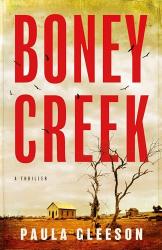
When several small-town locals die under mysterious circumstances, an aspiring journalist is determined to prove the connection between them, only to discover the dangerous secrets they left behind.
Boney Creek is a dying town where not a lot happens. The perfect solution for married couple Addie and Toby who are escaping their own personal tragedy. But a quiet and simple life is not exactly possible with so many recent, strange deaths.
Seven locals, all gone too soon. That’s the nature of tragic accidents. And in a town this small, there’s no room for too many questions.
But Addie isn’t so sure. Although she never followed through on her dreams of becoming a journalist, she still has a reporter’s instincts. And her gut—not to mention all the small-town gossip—is telling her that whatever’s happening in Boney Creek is not as random as it seems.
There’s no such thing as coincidence, especially when it comes to seven bodies. And while burying her own secrets, Addie digs up far greater ones that will have her asking if she will be the town’s next so-called accident.
Boney Creek, Paula Gleeson
The second novel from Australian writer Paula Gleeson, BONEY CREEK is set in the dying town of the same name, a hot, dusty, dry place that the world forgot about when the highway bypassed it.
After a traumatic experience in the city, Abbie and Toby move there, the new owners of the town general store, service station and post office - the sort of combination one stop shop that's very familiar to country residents. Groceries, fuel, the mail, odds and ends, and in more modern times, a place to get a coffee and sometimes some hot food and baked goods made by the store owner.
Only this is a town with secrets, Toby has a secret reason for them ending up there, while Abbie is keeping secrets about their experience in the city. Which makes for a lot of uncomfortable discoveries, and conversations. Especially as it quickly becomes apparent that there are seven questionable deaths in this community.
Turning from her previous role of journalism to that of an amateur detective / blogger, Abbie finds herself drawn into the town's story. Toby already had an in to events, but it's Abbie who really find herself deep in trying to understand what's happening in this strange little place.
And strange is the word that I keep coming back to as I sit down to write this review. BONEY CREEK is written by an Australian writer, who has the cadence and style of an Australian - you can pick it immediately. But the spelling and some (but not all) of the terminology is American. Every occurrence of "Mom" stood out, as did a severe shortage of u's. The story is very careful to not mention where Boney Creek is, yet it felt Australian rural, which made the inconsistent American-English usage jar. Whilst there was a sense of a small dying town in the heat, dry and dust, that inability to firmly locate it somewhere gave the novel a floaty feeling. Obviously this won't be an issue for US readers, and quite possibly that's the intended audience.
But the feeling did feed through to some of the plot points, in particular, Toby's revelations about his reason for choosing Boney Creek floated into view very early on in the plot, only to float away again until the last chapters of the book - which was strange. It seemed an integral part of the central premise, which overall had huge potential, but wasn't best served as well by the floaty, almost flighty nature of the two main characters, both of whom never quite managed to maintain a consistent believability. Overly dramatic when things were low key and almost blasé around the big stuff, for the longest time this reader was wondering about unreliable narrators. And I'm still not sure why, but the final chapters seemed to allow them both to let some very big stuff go straight through to the keeper.
Readers may also find an interesting juxtaposition of violent intent and reaction - you can't have seven suspect deaths without expecting that it's not all tea and scones after all, yet the style is lighter, veering towards cosy in places. The language of the blog that Abbie uses as her way of getting the story out, without going full on journalist, isn't quite what this reader had had expected of someone with her background, although her ability with the coffee machine, as somebody who had worked their way through Uni as a barista was.
Couldn't help but think I'd be very pleased to come across an espresso or a mocha the way Abbie makes them in a small service station in a dead town off the main highway. But that wouldn't come as too much of a surprise in Australia nowadays. All in all BONEY CREEK is going to very much be a YMMV.